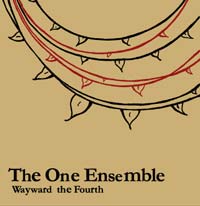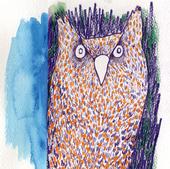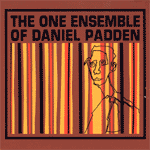|
the one ensemble of daniel padden
"At times turbulent and at others sombre: the music of Daniel Padden and his One Ensemble covers a lot of emotional ground. Formerly a solo venture, Padden – himself a key member of the hydra-headed Volcano the Bear – is now joined by Chris Hladowski, Peter Nicholson and Aby Vulliamy. Hladowski and Vulliamy, together with Hanna Tuulikki (who lends her voice to this recording) also release music under the moniker Nalle. Together, this topsy-turvy Glaswegian quartet put together tiny symphonies that incorporate elements of Eastern European folk, minimalist drone and string-laced chamber psych. The One Ensemble’s humbly haunted, multifarious tales look back to post-WWII Europe, following displaced settlers voyaging across the Atlantic towards the unknown. Cello, bouzouki, clarinet, guitar and piano all play a key role in reciting the woeful tale of humanity’s uncertain future. The most prominent and effective instrument however, is Padden’s plaintive wordless vocal, which at times evokes spirits formerly unearthed by Jeff Mangum. The intoxicating brew crafted by the deft hands of The One Ensemble is not difficult to swallow; its complex palette is cleverly disguised with beautiful melodies and a healthy dose of hopefulness. Padden and his band of minstrels have created a truly unique and engaging record, one that should be celebrated for the rare beauty contained within. Highly recommended!" 9/10 -- Bryon Hayes (3 April, 2007) Foxy Digitalis he One Ensemble Wayward the Fourth (Secret Eye) - "Had this one a while and been trying hard to summon the words to fully capture it's strange beauty. Daniel Padden is one fourth of the always fascinating Volcano the Bear. He's also released some delectable solo albums under the One Ensemble of Daniel Padden name for the last four years. What he did then was a kind of minimal free jazz/prog folk response to what folks like Robert Wyatt and Brian Eno were doing early in their careers with multi-tracks and instruments all performed by Padden. As with the recent Live at VPRO CD-R (Brainwashed), Wayward the Fourth is the work of a genuine ensemble, quartet to be exact, captured in a studio. The songs are gorgeous, twisted amalgams of European and American ethnic musics, free jazz, chamber music, minimalism and experimental plateaus rarely glimpsed in the western world, dispersed with just the right emotional -- ranging from giddy to somber -- intensity. There's vocals on a few tracks, a few bizarre deconstructions on some others, but what strikes me most about this is the sheer musicality, the deliberate attention to space, detail and compositional structure. One Ensemble albums have always sounded like this, but just as with Volcano the Bear's brilliant Classic Erasmus Fusion (Beta-Lactam Ring), the ensemble approach has reached new depths of cinematic, multi-hued brilliance. Easily one of the best '07 has coughed up so far."(Womblife)
live at VPRO Radio (Brainwashed) Daniel Padden is one-[fourth] of Volcano the Bear and, as heard on his beautifully twisted recordings as The One Ensemble of Daniel Padden, a talented composer in his own right. No false advertising; the first two One Ensemble albums, self-titled (Catsup Plate) and "The Owl of Fives" (Textile), were almost entirely solo affairs with Padden manning everything from guitar, bass and percussion to piano, violin, bouzouki and voice to conjure a spectral gypsy folk/jazz informed by European roots, the early art pop of Robert Wyatt and the bizarre violin-scapes of Aranos. "Live at VPRO Radio" (the home of the revered Mort Aux Vaches releases) is a CD-R that comes via Brainwashed's Handmade Series in an edition of 500 in folded letterpress sleeves. It's both an extremely lavish and minimal package, which accurately reflects the haunted ensemble performances captured within. This edition of the One Ensemble is in fact a quintet, with stunning support from Chris Hladowski (bouzouki), Jandek sideman Alex Nielson (drums/percussion), Peter Nicholson (cello), Aby Vulliamy (viola), and Padden rounds things out on guitar and vocals. Like Steven R Smith's Hala Strana, The One Ensemble takes much of its musical inspiration from more unlikely, but still relatively familiar, territory and combines it with a free jazz or prog approach. Jewish Klezmer, Gypsy and other Eastern Euro styles are drawn into Padden's dense web of ominous tonal phrasings, only to be built up, distended, collapsed and rebuilt. Volcano the Bear's early albums play like Nurse With Wound covering Robert Wyatt's "Rock Bottom," so it's no surprise that Padden's take on European roots leaves plenty of space for freer deconstructions, but what is surprising is just how beautiful these new renditions of his earlier recordings are. "Live at VPRO Radio" is dense with abstract ideas yet manages the rare feat of being composed and spontaneous. Padden's Wyatt-like vocal warbles might be hard for some to wrap their head around, but such an emotionally expressive tone fits right in among this surrealist display. Had I heard "Live..." in 05, it would've easily been among my favorite releases of the year. (9/10) - Lee Jackson, Foxy Digitalis I must admit to being rather dismissive about much of the current wave of so-called "free folk," and certainly I've also been guilty of declaring much of the music it has produced as being the product of an insufferable scenesterism. However, I've also been among the first to praise the truly worthy examples of the genre, and this new release by The One Ensemble of Daniel Padden clearly demonstrates that amazing work continues to come out of the new folk zeitgeist. For all of the undeniably interesting music, performance and aesthetic ingenuity that this scene has produced, it has also spawned an equal amount of talentless opportunism and obnoxious marketing, and a surplus of overpriced limited CD-Rs and LPs filled with senseless cacophony of questionable musical value. I mean, how many different ways are there for a bunch of unshaved bohos to pound tunelessly on a bunch of instruments they never bothered learning how to play, anyway? Live at VPRO Radio was recorded live in 2004, in a performance by the Ensemble for the famous Dutch radio station, and it's one of the most stunning live albums I've ever heard, without a doubt. The performance captured in this radio session easily eclipses Daniel Padden's two studio albums, and also exceeds the rather high standards set by his previous work with Volcano the Bear. The seven tracks on this CD showcase a marvelously talented composer and arranger leading an ensemble of adept musicians through his startlingly unique sound world. Far from sounding like some slapdash, impromptu assemblage thrown together for a one-off gig, the group sounds as if they were born to play Padden's songs, and after hearing this album, it's hard to imagine them playing anything else as well or convincingly. As on his studio albums, Padden freely borrows from the '60s psychedelic folk of groups like The Incredible String Band, along with a wide variety of disparate ethnic musics, but unlike his albums, which often sounded jarringly eclectic, Live at VPRO Radio sounds gloriously cohesive: a triumphant spontaneous creation of a wholly idiosyncratic style of folk music. Though it is tempting to pick through and try to identify specific ethnic signifiers in this beautiful melodies created here by bouzouki, cello, guitar, viola and drums, all of the music here feels of a piece. Under the supervision of Padden, this group effortlessly draws upon a veritable constellation of tantalizingly familiar musical traditions--Jewish Klezmer, Gypsy, Russian and British trad-folk, etc.--but at the same time, manages never to directly reference any of them. Many of the songs are radically reworked versions of tracks that originally appeared on 2004's The Owl of Fives, but they have been retrofitted to work within the live ensemble context, and arrive much the better for these alterations. I mentioned ISB, and while the comparison seens an appropriate one, it also fails to get across the power and ferocity of these performances, many which build to loud, celebratory climaxes, Padden enthusiastically egging the band on with non-verbal chanting and cajoling. Though the players are drawn mostly from the free folk scene, it is perhaps inaccurate to refer to this album as a work of free folk, as each song is clearly a work of composition. However, the performances captured here do not seem over-determined or rigidly rehearsed. On the contrary, it seems as if the group feels perfectly confident to travel outside of the lines of Padden's songs, and his songs provide a wonderfully loose structure upon which subtle group dynamics and improvisatory passages can play an important part. I can't be the only one who has often wondered if ensembles like Sunburned Hand of the Man or Jackie-O Motherfucker might be better and more reliable if they actually took the time to write some songs. There isn't a moment of wasted space or directionless meandering on Live at VPRO Radio, because the group can always fall back on the strong backbone of Padden's impressive songs. Live at VPRO Radio is a gorgeous and hypnotic work that joyously trips and tumbles through a dark, mediaeval wonderland that exists only on an astral plane; a collection of whimsical funeral dirges for a merry band of wandering monks intoxicated on bad liquor and thujone. It is a collection of hymns to wood sprites and elves; it is the soundtrack to suddenly noticing the glorious spectacle of an ant crawling up a tree trunk carrying a leaf. It is a magical conjuring act by a group of trickster alchemists wandering in a foreign land. It is often all of these things and sometimes none of them, but it is always unmistakably beautiful music. - Jonathan Dean, Brainwashed the owl of fives (textile) “The Owl of Fives” rivals the finest experimental folk releases of 04 or any other year." (Foxy Digitalis) "As much as we dig UK musical experimentalists Volcano The Bear and their disjointed sonic surrealism, VtB member Daniel Padden has always managed to take that sound of theirs even further, somewhere else entirely, to a place where his juxtapositions coalesce into a dark and highly personal, mostly instrumental melancholia. Meandering and thoughtful, like a twilight walk through a musical forest, just wandering, laying down on the ground when the mood strikes you, gazing at patches of sky through the dense canopy of leaves, feeling the wet earth soak through your clothes, shivering as small insects crawl all over you tickling your skin, squinting as you're blinded by a brilliant shaft of sunlight that breaks through the trees, then melts into the forest floor beneath while you're sprinkled with a fine mist as the wind looses the condensation from the branches. This not-so-precise effect is achieved with reverby pianos in vast expanses of space, slippery slide guitar, plinkety plonk keyboards, soaring minor key strings, Appalachian guitar picking over squirming beds of bombinating drones. Padden's dense buzzing ragas are all dreamy and melancholy and super intimate and personal sounding, but somehow at the same time are grandiose and epic, with occasional waltz-like marches, like chamber music for some outer space / otherworldly king and his court. Occasionally delicate and haunting, occasionally rambunctious and a little chaotic. But always totally beautiful and mesmerising and truly mysterious. Think somewhere between Eyvind Kang, the Sun City Girls, Kronos Quartet, Godspeed You Black Emperor, and Jack Rose. All that and more is filtered through Padden's slightly skewed musical mind's eye." (Aquarius Records) "Mezmerising terrain...Magical, mysterious, gorgeous and innovative...I can't recommend Padden's work enough. Essential." (Mats Gustafsson, Ptolemaic Terrascope) "The only album I bought this year that I think may have a secret life all of its own when I am not watching." (Sean Witzman, Foxy Digitalis) "The past few months have seen the dispersal of a clutch of side projects by the four members of Volcano The Bear, including Songs of Norway (Aaron Moore and Nick Mott), Earth Trumpet (Laurence Coleman), Guignol (Moore, Coleman and Jeremy Barnes of Bablicon) and El Monte (Mott solo). However, none of these projects have been as immediately enjoyable and as consistently rewarding as Daniel Padden's work as The One Ensemble. The Owl Of Fives is Padden's second full-length album, a collection of composed pieces run the gamut stylistically, but maintain an integrity that makes all of it unmistakably the work of the same talented musician. Padden freely borrows Oriental melodies, Fahey-style revenant blues, Indian classical, plaintive piano ballads and outsider folk traditions to create a platter of tuneful exploration that captured and held my attention for its entire length. The One Ensemble's arrangements are cleverly sparse, using as little as possible to convey the fragile melodies that populate the album. This compositional economy is the key element that allows The Owl Of Fives to achieve its stylistic shifts without seeming calculated or overwrought. In fact, as the album progresses from start to finish, the compounding of disparate music strategies gets better with each track, rather than becoming tiresome. The loose exotica of "Farewell, My Porcupine" welds Kyoto folk to Arthur Lyman piano jazz, replete with multitracked non-verbal chanting. Elsewhere, stately medieval melodies are created in the coversations between Padden's violin, acoustic guitar and piano. "Early Music of the Morning" takes its cue from the "morning raga," a term used in Indian classical music to connote a languid, relaxing melody appropriate for morning ablutions. Against a hazy drone, Padden pulls gently bending tones from his cello that brilliantly mimic a sitar. The recurring musical theme of "Still Flinging Clowns" most closely resemble the Bear, with its shambling, whimsical atmosphere and vocal glossolalia. The intimate production captures those tiny flaws - the scrape of cello strings, the clearing of throats - that lend an organic, present-tense quality to the music. With The Owl Of Fives, The One Ensemble of Daniel Padden has created a work of understated, melodic brilliance." (Jonathan Dean, Brainwashed) "...wonderful talent for creating music that seems both completely unearthly and utterly familiar at the same time. Even better than the eponymous debut, "The Owl Of Fives" is a joyous album indeed, convincingly fusing mainly folk-influenced melodies to unusual instrumentation; Padden is one of these musicians who seems to be able to do something with anything, be it a kazoo, a Stylophone, an unconventionally tuned guitar or even some wine glasses. Mostly instrumental and with a strong eastern European flavour at times, this is a cheeringly melodic, compelling and vivacious album which succeeds in holding the attention, in surprising the listener from beginning to end and in showcasing Padden's considerable talent without once feeling self-indulgent or showy. An absolute delight from start to finish..." (Moopy) This review has been put through the fantastical internet translator from the Italian Inoz website. Enjoy… the one ensemble of daniel padden (catsup plate) "An astonishing solo album...an epic voyage of beautifully composed experimental music...A god-like record." (Steve Hanson, Careless Talk Costs Lives / Ptolemaic Terrascope) “Strikingly beautiful at times, Padden's music truly comes from another place. Wholly unique and lush with feeling, "The One Ensemble of Daniel Padden" is a rare and unclassifiable masterpiece.” (Other Music) "An album that is so distinctly unique in its sound that it's hard to think of any comparisons at all." Mats Gustafsson, Ptolemaic Terrascope. “His soft deregulation of sounds obeys an internal logic, a secret unity which makes it all the more penetrating. Swift and Carroll are dead, but their Jack 'o' Lanterns are still dancing.” (Les Inrockuptibles) “He grasps past the legible edges of time in the way that Third Ear Band or Art Ensemble of Chicago (in their breath-space moments) would, to a raw earth music where the dead voices gather… The past is still alive, less repetitive and imitative, and more crossbred and permeable, a peculiar new strain of familiar sound twisted once again.” (Luna Kafe) |


